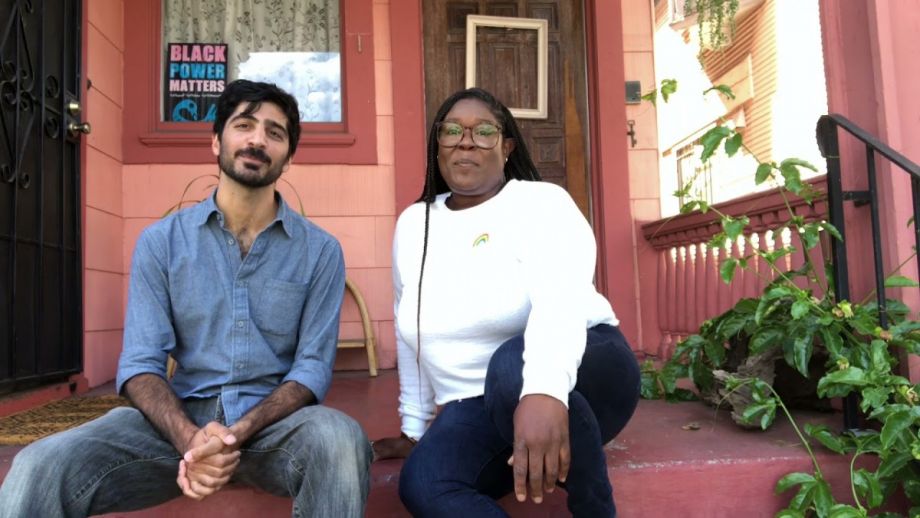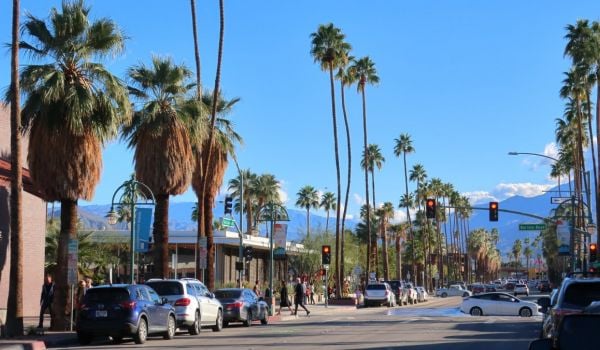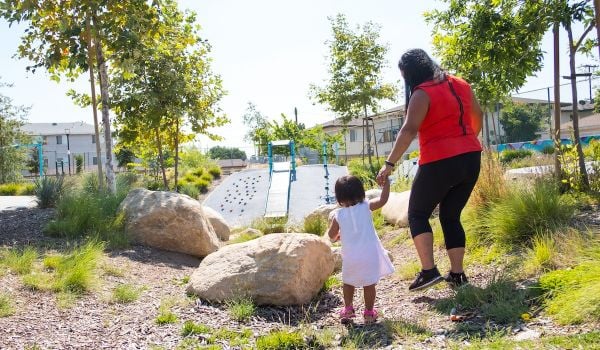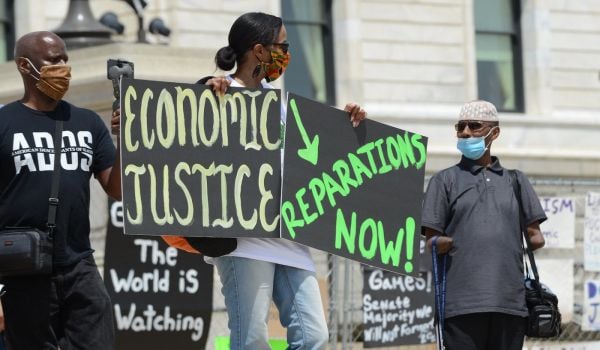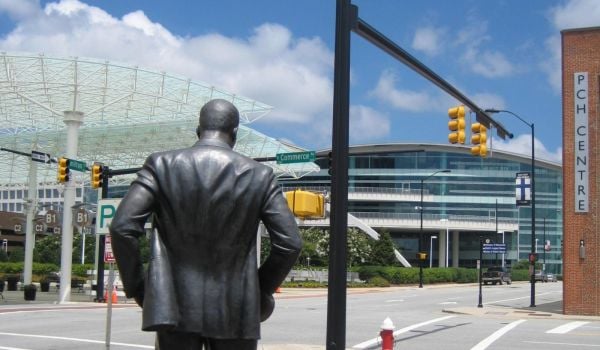While cryptocurrency investors are scrambling to figure out what to do after discovering they threw their dollars into a virtual bonfire, investors who took a chance on the East Bay Permanent Real Estate Cooperative are receiving their first ever dividend checks.
Some investors in the California real estate development entity assumed they were the ones burning their money. They were buying shares in a new kind of real estate cooperative controlled democratically by residents of Oakland’s historically redlined communities, who are usually left out of bigger real estate decisions. They invested anyway, believing that they were doing something good for the community even if the whole thing ultimately failed and they lost all their dollars. But those investors haven’t been shy about telling the cooperative’s staff how they felt about the model.
“The attitude of most mission-aligned lenders, most large scale institutional investors and even some of the government funds that we courted early on was that this is a bad investment and you cannot make this fly, there’s no way for this to work,” says executive director Noni Session, a third-generation West Oaklander. “I’ve had to be the object of so many demeaning conversations to get folks to release this money to us so we could test out our vision.”
To date, more than 350 investors from more than 20 states have invested a cumulative total of $3.25 million dollars into the East Bay Permanent Real Estate Cooperative. The smallest investments have been for the minimum, $1,000 — which some investors have paid in installments — while the largest single investment so far has been $500,000. Those dollars have helped the cooperative start working with local community organizers to acquire a small portfolio of residential and commercial properties, with more in the acquisition pipeline. The early investor dollars have helped attract other funders to the table.
It’s still early. East Bay Permanent Real Estate Cooperative is still very much in its startup phase and the odds are still stacked against it in an economy where other real estate entities with much deeper pockets prioritize profits above all else. But now some of the cooperative’s investors are getting dividend checks as small as $45 for investments made over the past three years.
“The biggest service of writing these $40 or $50 checks is so people understand that original cynicism, and that doubt, and really in many instances that demeaning response they had to our vision was [shortsighted],” Session says.
The East Bay Permanent Real Estate Cooperative, or EB PREC for short, is one of a few newer community-controlled or community-owned real estate entities that have emerged over the past few years. They vary widely in legal and governance structures, as well as locations and community demographics. Next City has reported on a few of them recently, like the E.G. Woode small business real estate collective on the South Side of Chicago, or Philadelphia’s Kensington Corridor Trust, Seattle’s Cultural Space Agency, or the Commongrounds Cooperative in Traverse City, Michigan.
More established community-owned or community-controlled real estate models like housing cooperatives and community land trusts are also making some recent waves. Earlier this year, Next City reported on San Francisco Community Land Trust acquiring a 40-unit apartment building in a gentrification hotspot using entirely private funding. And in St. Paul, community land trusts are now venturing into commercial real estate.
Community-owned or -controlled real estate entities tend to arise when people get tired of prevailing real estate development models failing to meet their needs. Sometimes the math just doesn’t work out for a traditional developer to come in and put together the resources needed for what a community needs while leaving enough profit left over for traditional investors on the hunt for maximum financial return. Sometimes the numbers work out too well, allowing speculative developers to come in and flip entire neighborhoods, pricing out existing residents and businesses.
As a practical matter, community-controlled real estate models are all looking for some kind of middle ground between those two extremes. They’re promising moderate rates of return to investors and other sources of capital, but not so much that the real estate entities need to charge exorbitant rents or sell properties to wealthier market-driven buyers at speculative prices after sinking piles of money into rehab or construction. They’re looking to create or preserve spaces for businesses that serve existing residents, and maybe business owners and workers also live nearby — instead of “attracting” new businesses that would likely be looking to serve newer, wealthier residents moving into housing units that are too expensive for existing community members.
Beyond the practical, deep down in each of their own ways these models are out to prove that community ownership or community control of real estate is a viable option that cities, investors and everyone else can take seriously. EB PREC’s early experiences show that they’re still not always considered a seriously viable, scalable model, even by their own investors. But maybe the dividend checks will serve as a key turning point in a new narrative about community-controlled real estate development.
The decision to declare dividends was not one taken lightly, nor one that hinged solely on investor voices. It was a decision made at the September meeting of EB PREC’s board, which primarily consists of residents and community organizers from the East Bay region’s Black and Indigenous communities. They had to consider the cooperative’s current and future income from rent, donations, philanthropic grants and contracts for consulting services, as well as current and future expenses, including property maintenance and rehab, construction costs, and staffing.
Dividend payments to investors might be lowest in priority, but when it came down to it, they weren’t left out this year.
The investor return isn’t a lot — EB PREC has set a target of just 1.5% of each investor’s original investment amount annually. Once purchased, the co-op’s shares cannot be sold to others or increase in price, so there’s no hope for profit by that route. But it’s still a meaningful return.
“Having this moment where EB PREC is signaling they are a legit, viable investment opportunity by way of saying here’s a dividend check, that is so huge,” says Tiffany Brown, a financial advisor whose clients are among EB PREC’s largest investors so far. “Even if they’re building something that’s counter-cultural, it’s really important to show proof of viability, to legitimize what could have initially felt like an idea that maybe wouldn’t get much traction because of the way that capitalism is set up.”
If community-controlled real estate ever does become more prevalent across the country, Brown hopes to play an important role in that story. Unlike the other investors, who believed they were probably throwing away their money, Brown’s clients are believers in the model.
Brown’s clients, who come from all over the U.S., are explicitly looking for more investment opportunities across the country like EB PREC. The firm she co-founded, Chordata Capital, identifies as an explicitly anti-capitalist financial advisory firm. They don’t invest any of their clients’ dollars into companies on the stock market; instead, Bay Area-based Brown and New Jersey-based co-founder Kate Poole scour the country for investments that reflect the kind of racially, socially and environmentally just world they want to see. So far, their four-year old firm manages $100 million in assets from more than two dozen clients, making investments in initiatives like EB PREC, the Boston Ujima Project or the Runway Project.
Brown and her firm don’t receive paid commissions from EB PREC or Boston Ujima Project or from any of the organizations they recommend for investment. She gets paid by her clients to manage a slice of their wealth. So she’s not looking for her clients to lose any money, since that would hurt Chordata Capital’s bottom line and reputation. Brown’s job is to evaluate potential investments — what investors call doing due diligence.
Some investors only expect financial due diligence, but Brown’s clients are among a growing slice of investors who also want to hear about the potential positive racial, social or environmental impact of investment opportunities. Due diligence for these investors means putting potential opportunities like EB PREC through a gauntlet of hours-long conference calls and forms with dozens upon dozens of questions. But if you can get through that process once with Brown, you don’t have to repeat the process with each of her clients.
At this point, EB PREC has been through multiple due diligence processes with multiple financial advisors with clients looking for these kinds of investment opportunities. And every year there are more and more of these kinds of specialized financial advisory firms emerging that have similar goals and missions for their clients.
“Because of the due diligence that we’ve already completed with these investment advisory firms, it’s made the process simpler,” says Annie McShiras, investment and fundraising director. “We receive an investment agreement, we sign off on it, and then they write the check.”

Oscar is Next City's senior economic justice correspondent. He previously served as Next City’s editor from 2018-2019, and was a Next City Equitable Cities Fellow from 2015-2016. Since 2011, Oscar has covered community development finance, community banking, impact investing, economic development, housing and more for media outlets such as Shelterforce, B Magazine, Impact Alpha and Fast Company.
Follow Oscar .(JavaScript must be enabled to view this email address)

